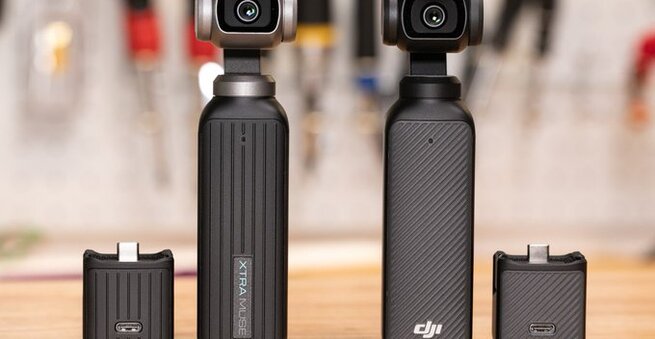
DJI’s cameras are among the most loved in the world, but new import tariffs have driven their U.S. prices up. Enter Xtra: the company that lets DJI sneak its popular cameras into the US — a mysterious new player that might be helping DJI sidestep trade barriers and customs scrutiny.
The story starts with the DJI Osmo Pocket 3, a handheld steadicam adored by vloggers and creators. In the U.S., it now costs $799 after tariff-fueled price hikes. But a nearly identical camera — the “Xtra Muse” — has surfaced on Amazon for as low as $499 during major sales.
Software engineer and DJI watcher Konrad Iturbe first pointed out the strange connection between DJI and Xtra Technology. On paper, Xtra looks like a separate company. But a closer look reveals striking similarities:
The Xtra Muse, Action 4, and Action 5 Pro appear to share identical components with DJI’s official cameras.
FCC teardown photos show matching boards, chips, and internal layouts.
Even the firmware and app design carry DJI’s fingerprints.
Security consultant Jon Sawyer confirmed that Xtra’s app reuses DJI’s code — thousands of lines of it. In fact, the app still contains 7,552 references to DJI’s own video editing software, LightCut, and even its e-bike system, Avinox.
When asked directly about the link, DJI declined to comment, neither confirming nor denying involvement with Xtra. That silence speaks volumes — especially since it would be easy for the company to deny any connection if none existed.
To investigate further, reporter Sean Hollister purchased both the DJI Osmo Pocket 3 and the Xtra Muse. The results were undeniable: both devices are virtually identical, right down to the feel of the buttons and the image stabilization performance.
If Xtra is indeed a front for DJI, it represents a creative — and controversial — way to dodge U.S. import tariffs. By branding its products under a different name, DJI could technically bypass restrictions that have raised prices on its flagship gadgets.
While there’s no official confirmation, the evidence paints a clear picture. Xtra’s product lineup, app architecture, and marketing language are too similar to DJI’s to be coincidence.
For American creators and vloggers, Xtra’s offerings might look like a great deal — the same DJI tech at a lower cost. However, it also raises questions about transparency, product support, and legality. If DJI is indeed behind Xtra, the move could trigger regulatory backlash or future import bans.
Still, the strategy reveals how far tech companies are willing to go to protect their market share and maintain pricing competitiveness in the face of global trade tensions.
The rise of Xtra: the company that lets DJI sneak its popular cameras into the US highlights a growing trend among international tech brands: rebranding or restructuring to survive geopolitical headwinds.
Whether it’s clever business or a questionable loophole, Xtra’s existence underscores one thing — the battle between innovation and regulation is far from over.
𝗦𝗲𝗺𝗮𝘀𝗼𝗰𝗶𝗮𝗹 𝗶𝘀 𝘄𝗵𝗲𝗿𝗲 𝗿𝗲𝗮𝗹 𝗽𝗲𝗼𝗽𝗹𝗲 𝗰𝗼𝗻𝗻𝗲𝗰𝘁, 𝗴𝗿𝗼𝘄, 𝗮𝗻𝗱 𝗯𝗲𝗹𝗼𝗻𝗴. We’re more than just a social platform — from jobs and blogs to events and daily chats, we bring people and ideas together in one simple, meaningful space.